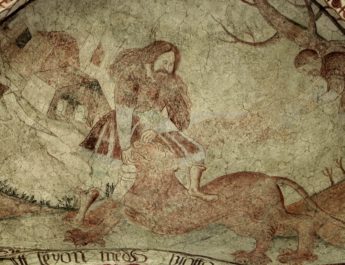Psalm 96
Christmas Eve ABC
NL317
1 O singA to the LordB a newC song;D
A “sing” = shir. From shir (song, singer). This is to sing. It could also refer to one who is singing or leading others in song.
B “Lord” = YHVH. From havah (to be, become) or hayah (to come to pass, become, be). This is the name of the God of Israel, the self-existent and eternal one, the tetragrammaton. This pronunciation has been lost to time so “Lord” is generally used in its place.
C “new” = chadash. From chadash (to renew or restore, to repair or rebuild). This is something fresh or new.
D “song” = shir. Related to “sing” in v1. See note A above.
sing to the Lord, allE the earth.F
2 Sing to the Lord, blessG his name;H
E “all” = kol. From kalal (to complete). This is all or every.
F “earth” = erets. Root may mean to be firm. This is earth, ground, field land, or country.
G “bless” = barak. This is to kneel, to bless. It is blessing God as part of worship and adoration or blessing humans to help them. It can be used as a euphemism to say curse God.
H “name” = shem. May be from sum (to put, place, set). This is name, fame, renown. A name was thought to indicate something essential about a person – something about their individuality. So, this word can also mean honor, authority, or character.
tellI of his salvationJ from dayK to day.
I “tell” = basar. This is being a messenger, to publish, carry, or preach. Properly, this is being fresh, rosy or cheerful as one bearing news.
J “salvation” = yeshuah. From yasha (to deliver, defend, help, preserve, rescue, be safe. Properly, to be open, wide or free, which implies being safe. Used causatively, it means to free). This is salvation, deliverance, health, victory, prosperity.
K “day” = yom. Root may mean being hot. This is the day in a literal or figurative sense. It can also mean birth, age, daylight, continually or other references to time.
3 DeclareL his gloryM among the nations,N
his marvelous worksO among all the peoples.P
L “declare” = saphar. From sepher (writing, document, book, evidence). This is properly to tally or record something. It can be enumerate, recount, number, celebrate, or declare.
M “glory” = kabod. From kabad (to be heavy, weighty, burdensome). This is weighty. Figuratively, glorious, abundant, riches, honor, splendor – a reference to one’s reputation or character. This word is often used to describe God and God’s presence.
N “nations” = goy. From the same root as gevah (the back, person, or body); related to gev (among); related to gaah (to rise up). This is nation or people. Often used to refer to Gentiles or foreign nations. It can also be used figuratively for a group of animals. This is where the Yiddish “goy” comes from.
O “marvelous works” = pala. From pele (wonder, miracle, wonderful, marvelous thing). This is to be extraordinary, to arise, to be great or accomplish.
P “peoples” = am. From amam (to darken, hide, associate; creating shadows by huddling together). This is people or nation. It can be used specifically for a tribe, collectively of troops or armies, or figuratively to refer to a flock of animals.
4 For greatQ is the Lord, and greatlyR to be praised;S
he is to be reveredT above all gods.U
Q “great” = gadol. From gadal (to grow up, become great, become wealthy – to advance. The root meaning may be to twist in the sense of the process of growing). This is great, high, bigger, noble, old, marvelous. It can also refer to someone who is powerful or distinguished.
R “greatly” = meod. Perhaps from the same as uwd (firebrand, a poker). This is very, greatly, exceedingly. It can also mean vehemence, force, abundance.
S “praised” = halal. This is to be clear – it originally referred to a sound, then a color. It was to shine and then make a show or boast then to rave. In a causative sense it came to mean celebrate, give glory, sing praise, or be worth of praise. Because of the celebratory nature of the word, it could also mean to give in marriage. This is where Hallelujah comes from.
T “revered” = yare. This is to fear, be afraid, dreadful. It can also refer to fearful reverence – to fear in a moral sense is to say to revere, respect.
U “gods” = elohim. From eloah (God, a god); from el (God, a god). This is most commonly used as a name for God. Technically, it’s in the plural, i.e. gods. It can also mean great, mighty, judge, or ruler.
5 For all the gods of the peoples are idols,V
but the Lord madeW the heavens.X
6 HonorY and majestyZ are beforeAA him;
V “idols” = elil. Perhaps from al (not, nothing, lacking value). This is futility, vanity. It can also refer to an image or idol.
W “made” = asah. This is to make, do, act, appoint, become in many senses.
X “heavens” = shamayim. Root may mean being lofty. This is sky, the air, or heaven. It is in a dual noun form so this might refer to the part of the sky where the clouds move on the one hand and the part beyond that where the sun, moon, and stars are on the other hand.
Y “honor” = hod. This is grandeur, beauty, glory, honor, or authority. It emphasizes a form or appearance with gravitas.
Z “majesty” = hadar. From hadar (to honor or adorn; majestic, respected, glorious; to favor or honor; to be proud). This is ornament, splendor, beauty, dignity, majesty, magnificence, and glory.
AA “before” = paneh. From panah (to turn, face, appear). This is face in a literal or figurative sense. It could be face, presence, anger, respect. It can also be used of God to indicate divine favor or presence.
strengthBB and beautyCC are in his sanctuary.DD
BB “strength” = oz. From azaz (to be strong, become fixed, be bold, prevail, be impudent; it means to be stout literally or figuratively. A Late Hebrew word). This is strength in the sense of force, majesty, praise, material and physical strength, the abstract notion of security. It can also speak of social or political power.
CC “beauty” = tipharah. From paar (to beautify or adorn, to gleam; can refer to showing honor or glorifying someone; also to boast or to shake a tree for harvest). This is beautiful, splendor, adornment, honor, bravery.
DD “sanctuary” = miqdash. From the same as qodesh (set apart and so sacred; God is different from us and so God is holy/set apart; things we dedicate to God’s service are set apart for God and so they, too, are holy); related to qadash (set apart, consecrated, hallowed, sanctified; something or someone set apart for a holy purpose or use – ceremonially or morally clean). This is a sacred place, sanctuary, holy place. It is something or somewhere that is consecrated, whether to God or to another.
7 AscribeEE to the Lord, O familiesFF of the peoples,
ascribe to the Lord glory and strength.
8 Ascribe to the Lord the glory due his name;
bringGG an offering,HH and comeII into his courts.JJ
EE “ascribe” = yahab. This is give, put, bring, take. It is to give in a literal or figurative sense.
FF “families” = mishpachah. From the same as shiphcah (maid, maidservant); root means to spread out. This is one’s circle of relatives – clan, family, kindred.
GG “bring” = nasa. This is to lift in a broad sense, literally and figuratively. So it could be to carry, take, or arise. It could also be bring forth, advance, accept.
HH “offering” = minchah. This is a gift or an offering, particularly a sacrificial one that is generally bloodless and given spontaneously (voluntarily).
II “come” = bo. This is to enter, come in, advance, fulfill, bring offerings, enter to worship, attack. It can also have a sexual connotation.
JJ “courts” = chatser. From chatsar (to blow a trumpet, trumpeter, to surround); from chatsotsrah (trumpet). This is an enclosure or court – a yard that is fenced in. It could also be a village or hamlet that is walled in.
9 WorshipKK the Lord in holyLL splendor;MM
trembleNN beforeOO him, all the earth.
KK “worship” = shachah. This is to bow down, make a humble entreaty, to do homage to royalty or to God.
LL “holy” = qodesh. Related to “sanctuary” in v6. Se note DD above.
MM “splendor” = hadarah. Related to “majesty” in v6. 5x in OT – 2x in Psalms, 2x in Chronicles, and 1x in Proverbs. From hadar (see note Z above). This is beauty, honor, decoration.
NN “tremble” = chul. This is whirling around so dancing as in a circle or writhing in pain. It is used particularly for the pain of childbirth or from writhing due to fear. It can also be falling in pain or waiting.
OO “before” = paneh. Same as “before” in v6. See note AA above.
10 Say among the nations, “The Lord is king!PP
The worldQQ is firmly established;RR it shall neverSS be moved.TT
He will judgeUU the peoples with equity.”VV
PP “is king” = malak. To be or become king or queen, to rise to the throne, to be crowned. By implication, to take counsel. This word may be from the Hebrew word for king “melek” or vice versa.
QQ “world” = tebel. From yabal (to lead, bring, carry, conduct; properly, to flow; to bring or lead with fanfare). This is world, confusion, inhabited part of the earth, but also used for the whole world.
RR “is firmly established” = kun. Properly, this means in a perpendicular position. So, it is set up in a literal sense – establish, fix, fasten, prepare. In a figurative sense, it is certainty, to be firm, faithfulness, render sure or prosperous.
SS “never” = bal. From balah (to grow old, wear out, consume, waste, enjoy, fail, decay). This is not, lest, neither. Properly, it refers to a failure, so it implies nothing or not at all.
TT “be moved” = mot. This is to shake, slip, falter, stagger, move, fall, give way, waver, be carried.
UU “judge” = din. This is to judge, defend, dispute, govern, quarrel, plead.
VV “equity” = meshar. 19x in OT. From yashar (to be straight, right, even, agreeable). This is evenness, straightness, prosperity, or uprightness.
11 Let the heavens be glad,WW and let the earth rejoice;XX
let the seaYY roar,ZZ and all that fills it;AAA
WW “be glad” = samach. This is to rejoice or be glad. Properly, it is to brighten up in a literal or figurative sense.
XX “rejoice” = gil. Properly, this is twirling around because of a strong feeling whether of rejoicing or from fear. This can be rejoice, be glad or joyful, or to cry.
YY “sea” = yam. Root may mean to roar. This is the sea, often referring to the Mediterranean. It comes from the root in the sense of the roar of crashing surf. This word is sometimes used for rivers or other sources of water. It can mean to the west or to the south.
ZZ “roar” = raam. 13x in OT. From raam (thunder). This is to trouble, be agitated, irritated, angered. It is used specifically for a peal of thunder.
AAA “all that fills it” = melo. From male (fill, satisfy, replenish, accomplish, fulfill, confirm, or consecrate; fill in a literal or figurative sense). This is fullness in a literal or figurative sense.
12 let the fieldBBB exult,CCC and everythingDDD in it.
Then shall all the treesEEE of the forestFFF sing for joyGGG
BBB “field” = sadeh. This is literally field, ground, soil, or land. It can be used to mean wild like a wild animal.
CCC “exult” = alaz. 16x in OT. This is to jump for joy, rejoice, triumph, or be jubilant.
DDD “everything” = kol. Same as “all” in v1. See note E above.
EEE “trees” = ets. Perhaps from atsah (to shut, fasten, firm up, to close one’s eyes). This is tree or other things related to trees like wood, sticks, or stalks. It can also refer to wood products like a plank or staff or gallows. Additionally, this can refer to a carpenter.
FFF “forest” = ya’ar. This is honeycomb, forest, thicket. Root may mean thick with green growth. It is a forest as a place where one would find honeycomb.
GGG “sing for joy” = ranan. This is a cry of joy or a joyful song. Properly, it is emitting a shrill sound, especially one of joy.
13 beforeHHH the Lord; for he is coming,
for he is coming to judgeIII the earth.
He will judgeJJJ the world with righteousness,KKK
and the peoples with his truth.LLL
HHH “before” = paneh. Same as “before” in v6. See note AA above.
III “judge” = shaphat. This is to judge, defend, pronounce judgment, condemn, or govern. It can refer to God judging or to human judges. This is pronouncing a verdict in favor or against so it implies consequences or punishment. It can also mean to litigate or govern as one with authority.
JJJ “judge” = shaphat. Same as “judge” in v13. See note III above.
KKK “righteousness” = tsedeq. This is rightness, righteousness, vindication. It is everything that is just or ethical. That which is right in a natural, moral, or legal sense. It also includes just weights (i.e. true weights). Figuratively, this is justice, righteousness, equity – even prosperity.
LLL “truth” = emunah. From aman (to believe, endure, fulfill, confirm, support, be faithful, put one’s trust in, be steadfast. Figuratively, this is to be firm, steadfast, or faithful, trusting, believing, being permanent, morally solid). This word is literally firmness, but figuratively fidelity, faithfulness, honesty, responsibility, trust, truth, steadfastness. This word shares a root with the word “Amen.”
Image credit: “Axis Mundi” by Mathieu Bertrand Struck, 2007.




